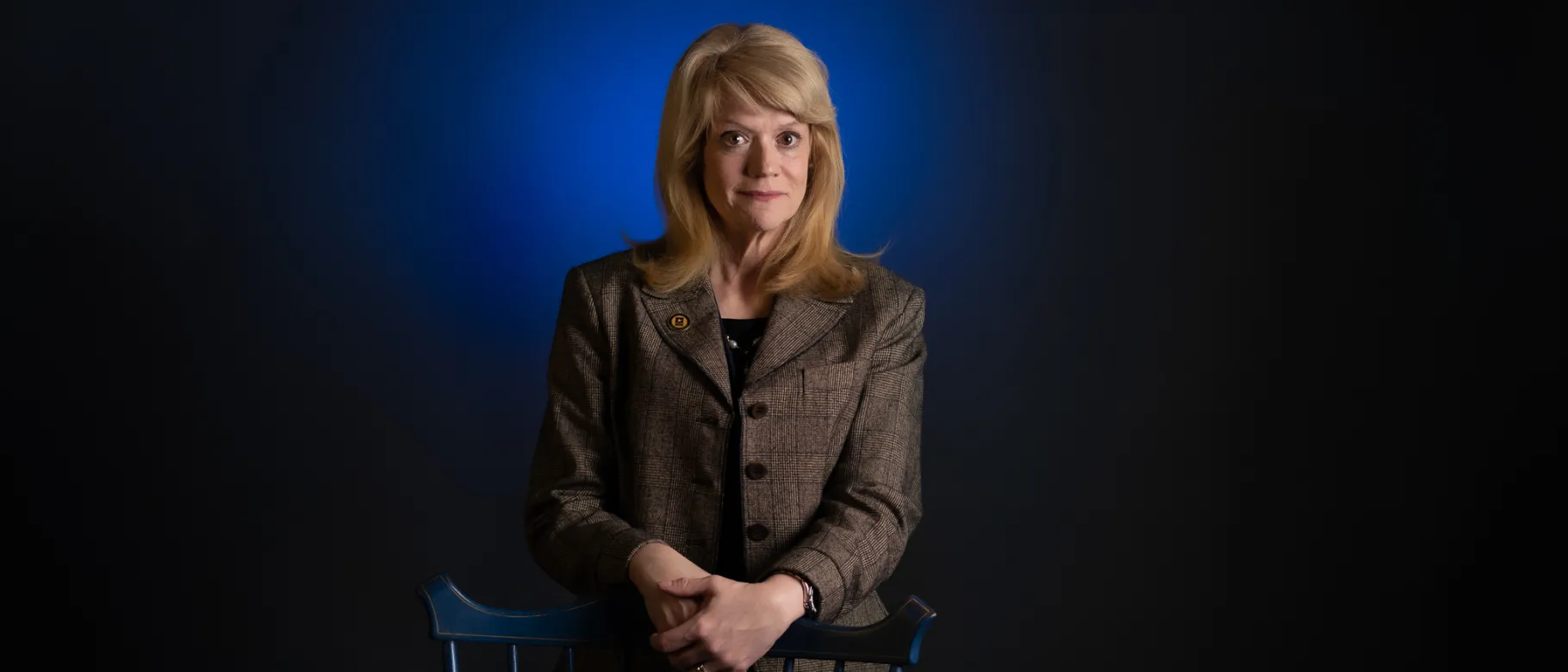'Something bigger than myself:' UNE alum and veteran uses her passion to help others

For Chrystine Collins-Blum, caring for others is not only a staple of her personality, but a skill refined through years of service and education.
Collins-Blum earned her Masters in Social Work degree from UNE Online in 2022 and is now a Patient-Aligned Care Team (PACT) social worker at the Veterans Affairs (VA) Medical Center in Manchester, New Hampshire.
She had the desire to become a social worker as early as the first grade when she read a children’s version of Jane Addams’ biography.
“I was just amazed, even in first grade, at what she did as a social worker,” said Collins-Blum. Addams, a progressive reformer in the late 1800s, was one of the country’s first social workers and cofounded the Hull House in Chicago, the first settlement house in the United States.
Collins-Blum said her interests eventually “veered” toward the military, and she joined the Army National Guard in 1984 on her 17th birthday. After spending several years helping helicopter flight crews with administrative and communication tasks, she went to officer candidate school before leading a platoon in a chemical company.
This is where she started to connect her two interests: the military and social work.
“One of the things I liked about that company, as a leadership role, I was taking care of the soldiers,” Collins-Blum said. “We were doing the training for the mission, but I was also taking care of the soldiers and helping them develop their career and their professional development.”
It is also where she discovered her natural ability to be empathetic and compassionate for the people she is helping.
“There’s an important tenant in the military that is, ‘You just take care of your soldiers no matter what.’ You show them that loyalty. And when they see that sincere desire to take care of them, you know they will be loyal to you in return,” she said.
Collins-Blum knew she needed to continue her education and quickly found the Veterans Affairs hospitals as a natural fit for a career outside of the military.
“I went from caring for soldiers to caring for veterans,” she said.
Collins-Blum said she chose UNE Online’s Masters in Social Work program because of its holistic approach, teaching students all corners of the profession. Once she learned about the trauma-informed care certificate that can be integrated into the curriculum, she was sold.
“I didn't see the trauma-informed care certificate at a couple of the other programs that I looked at,” she said. “I (also) liked the fact that a lot of the instructors were not only educators but also professionals working in the field.”
Collins-Blum said the skills she learned through the trauma-informed care certificate are crucial in her work at the VA hospital, like not making assumptions based on perceived societal norms, or taking the time to make sure the client is comfortable with her asking personal questions. Trauma-informed care also taught her how certain client behaviors, like running late or canceling an appointment, are not signs of disinterest or disengagement but are actual signs of trauma.
“It's not bad behavior from your client or your veteran; it's just a symptom of what they've been through. And it's something that we need to take into account.”
Today, Collins-Blum champions the trauma-informed care she learned at UNE to help her connect with veterans who may be hesitant to seek out the care they need.
“For a lot of veterans, just walking in the door is traumatic, and if they don't have a good first experience, if you're rude or you're dismissive, they're not coming back to the VA. And a very high percentage of veterans who die by suicide were never connected with the VA at all. So, we really have a huge responsibility and obligation to focus trauma-informed care so we can reach that population we are dedicated to serving.”
Despite the challenges, Collins-Blum said she is happy and proud of the job she does each day.
“I’ve heard many strong military leaders talk about what a privilege it is to lead soldiers and care for soldiers,” she said. “And I feel privileged every day that I get to go in and be a social worker for veterans.”